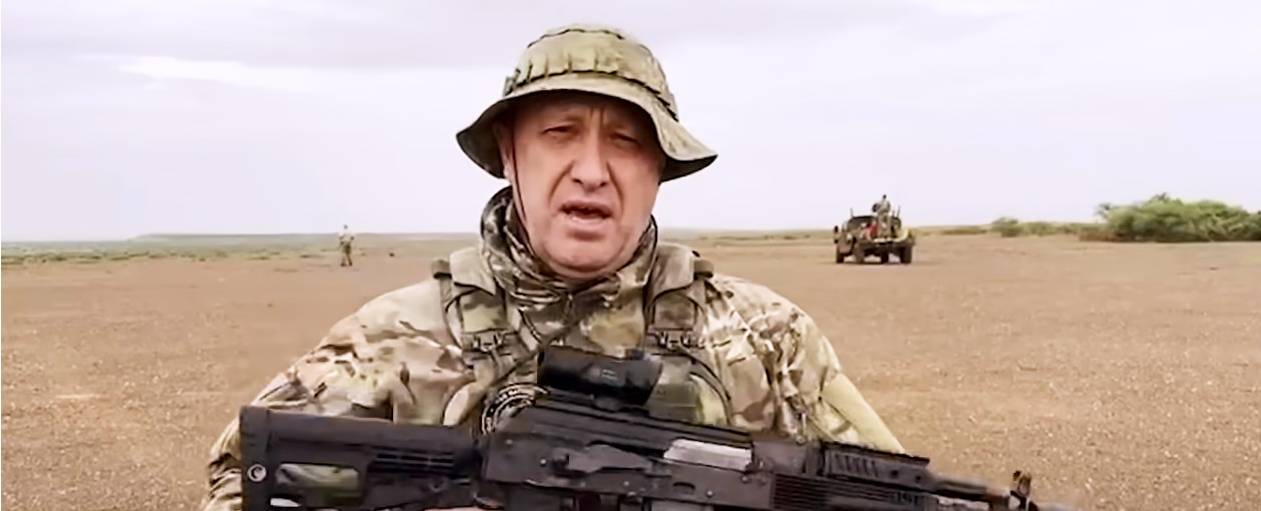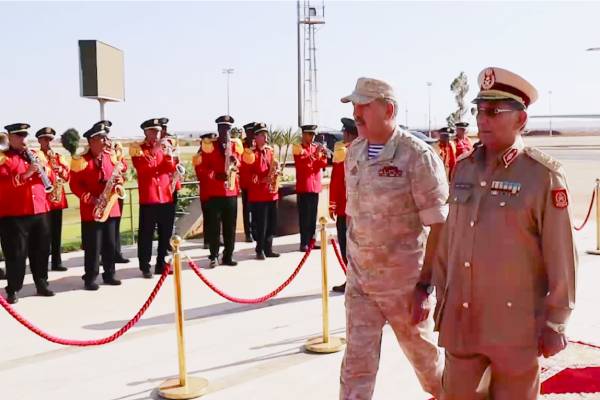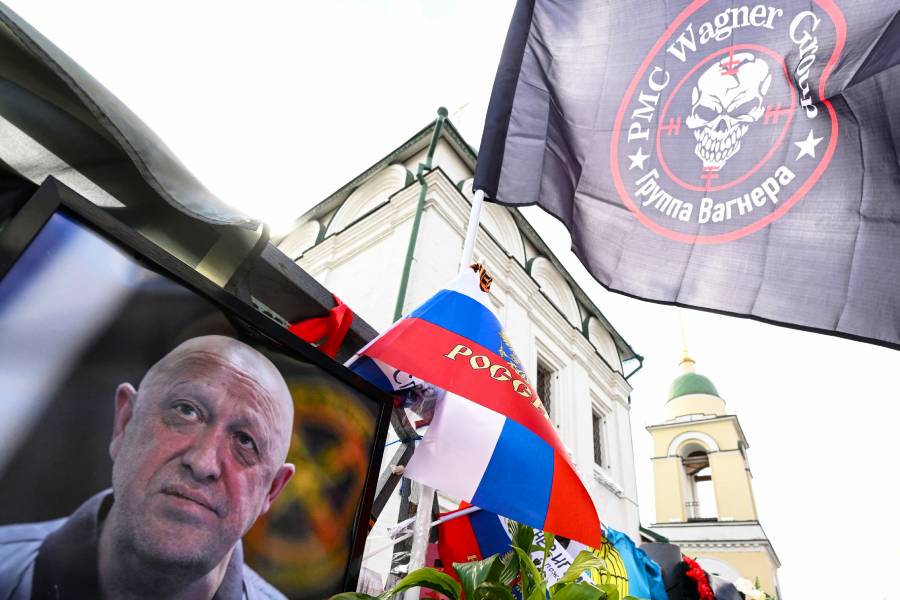
Yevgeny Prigozhin in Africa shortly before his death. (Photo: screen capture)
The apparent assassination of Yevgeny Prigozhin from the crash of his private jet between Moscow and St. Petersburg represents an inflection point in Russia-Africa relations. Prigozhin, leader of the notorious Wagner Group, was the point man for Russia in Africa since Wagner first began operations on the continent in 2017. Its leaders have been sanctioned by 30 countries for the group’s destabilizing activities.
Prigozhin was believed to be living on borrowed time after he led a short-lived insurrection—part of a power struggle with the Russian military leadership—in June. While he quickly backed down, the action embarrassed Russian president Vladimir Putin and triggered chatter that Putin’s perceived weakness would embolden other challengers to his authority.
Wagner has been attempting to influence domestic political outcomes and information narratives in some two dozen African countries.
Prigozhin advanced Russian influence by propping up politically isolated and unpopular authoritarian leaders who were then beholden to Russian interests. This support took a variety of irregular channels including the deployment of paramilitary forces, targeted disinformation campaigns, election interference, intimidation of political opponents, and arms for resources deals. Prigozhin referred to this interlocking set of influence operations as “The Orchestra,” which he conducted.
While most attention has been given to the African countries to which Wagner deployed forces—Libya, CAR, Mali, and Sudan—Wagner has been attempting to influence domestic political outcomes and information narratives in some two dozen African countries.
The breadth of Russian political interference in Africa points to Russia’s strategic aims for the continent—to secure an enduring foothold in North Africa and the Red Sea, to undermine Western influence, to normalize authoritarianism, and to displace the UN-based international system.
None of these objectives are about making Africa more prosperous or stable. Rather, Africa is primarily a theater to advance Russia’s geostrategic interests.
Maintaining Wagner without Prigozhin
The Wagner model has seen Russian influence expand rapidly in Africa, despite Russia investing very little on the continent. Most of Wagner’s costs have been covered through cash and mineral concessions provided by the host regimes. By some accounts revenues from mining operations in Central African Republic and Sudan generate billions.

Russian Deputy Defense Minister Yunus-bek Yevkurov (left) arriving in Libya to meet with Khalifa Haftar.
(Photo: Russian Defense Ministry)
It is no surprise that Russia would want to keep the Wagner enterprise going. Tellingly, on the day of Prigozhin’s plane crash, Deputy Defense Minister Yunus-Bek Yevkurov was in Libya to reassure warlord Khalifa Haftar of Russia’s ongoing support. Yevkurov later visited the military juntas in Mali and Burkina Faso to deliver the same message.
The question will be whether the Russian military has the capacity. Russia needs soldiers in Ukraine. So, Russia may not have experienced fighters to spare in Africa. It is also an open question whether Wagner troops will agree to sign contracts with the Russian Ministry of Defense given the way their leader was dispatched.
The Russian state would also need to recreate the freewheeling multidimensional security, political, informational, and business dealings that made Wagner’s operations effective in shoring up client regimes. While Russia has for years promoted hybrid warfare—the fusion of conventional conflict and subversive tools, synchronizing this across multiple African contexts with a myriad of personal connections that Prigozhin had cultivated will require a higher level of dexterity than the Russian security bureaucracy is likely capable.
Finally, and perhaps most significantly, Russia has benefited from the plausible deniability that Wagner has provided while doing Russia’s bidding. In every context in which Wagner forces have been deployed, they have been credibly accused of human rights abuses including rape, torture, and extrajudicial killings. In Mali, Wagner is linked to more than 320 incidents of human rights abuses and hundreds of civilian deaths. Wagner has also been accused of driving away local communities where Wagner has secured mining concessions, effectively annexing this territory.
By directly taking over the mantle of Wagner operations in Africa, the Russian government can no longer claim ignorance or impotence to do anything about these unlawful and destabilizing actions. While Russia has largely escaped serious reputational costs for Wagner’s thuggish activities in Africa, this will change with Russia stepping from behind the shadows to own the repressive tactics Wagner has deployed.
Reassessments in Africa
What of Wagner’s African clients? Leaders of these regimes have come to power through extraconstitutional means. They restrict opposition voices and media. They are isolated internationally. They simply cannot survive without Moscow’s support. So, we should not expect a change in receptivity from the military juntas in Mali, Sudan, Burkina Faso, the coopted leadership in the Central African Republic, or the Libyan warlord, Khalifa Haftar.
The Russian government can no longer claim ignorance or impotence to do anything about Wagner’s unlawful and destabilizing actions.
What will be telling is the reaction from other governments on the continent. Some will continue to see value in flirting with Russia as a way of hedging against international criticism.
Russia’s reach in Africa may be exceeding its grasp, however. There is a growing awakening on the continent of how little Russia actually brings to Africa in terms of investment, trade, jobs creation, or security. Its deployment of mercenaries, polarizing disinformation, political interference, and opaque arms for resources deals means Russia is actually an amplifier of instability on the continent.
The symbolism of this was vividly brought home in the days before the Russia-Africa Summit at the end of July. Russia pulled out of the Black Sea Grain deal that had facilitated the disbursement of 33 million metric tons of grain from Ukraine to Africa and other parts of the world. The deal had eased the supply chain restrictions caused by Russia’s invasion of Ukraine in 2022, resulting in much hardship in Africa. Not only did Russia scuttle the deal but it bombed the Ukrainian ports that were exporting the grain, wasting 180,000 metric tons in the process. The contempt Putin showed for African interests by this action was hard to ignore.

A memorial for Prigozhin in Moscow. (Photo: AFP)
This disregard, coupled with recognition that Russia offers relatively little to Africa, contributed to only 17 African heads of state attending the St. Petersburg summit. By comparison, 43 African heads of state participated in the 2019 Russia-Africa Summit in Sochi.
The way that Prigozhin was eliminated must also give African leaders pause.
Vladimir Putin speaks often of his desire to create a new international order. Russia’s lawlessness at home and abroad is bringing into sharp focus what his world order would look like. And that’s not a vision many African leaders share.
This article is republished from The Conversation under a Creative Commons license. Read the original article.
More on: Russia in Africa

